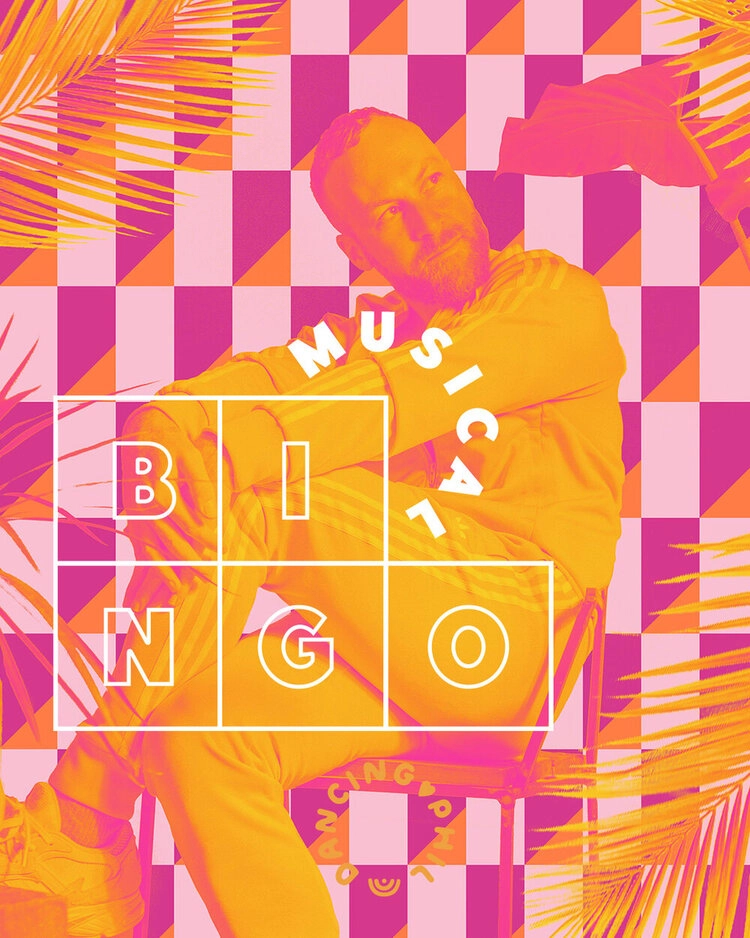Trailblazers: Meet Phil Villeneuve, A One-Man Virtual Experience
We were lucky to interview Musical Bingo devotee Phil Villeneuve in the first of our Trailblazer series on virtual experiences and the future of remote work.
by Reza Farahani - July 20th, 2021
We were lucky to interview Musical Bingo devotee Phil Villeneuve in the first of our Trailblazer series on virtual experiences and the future of remote work. Here, he shares his insights on how to host virtual events and his tips and tricks on pricing your own events! Phil started Musical Bingo at Soho House Toronto in 2015, and it quickly took off, bringing the high-energy game to Soho House in LA, Miami, New York, and Chicago. With the assistance of a fantastic partner backstage, he's since brought other games online, working to create fun virtual events with companies like Tinder, Interac, RBC, and The Chase Group.
When did you start hosting online experiences?
April of 2020 was when I started experimenting with online DJ stuff and online dance parties. And then, I started experimenting more with online virtual bingo about a month later, in May, but it was sort of rocky as we weren't sure what was going on or how it was supposed to work. However, as the months went on, we narrowed it down to a bit more science in terms of what works online musically and what works with people's screens with sound and video sharing. We're learning more and more about technology every day, and the more we know about technology, the more we can refine it and make it more fun — under control and fun.
What was the transition from in-person events to virtual events like?
It has been like two different worlds. It was exciting because the world was so weird. So we were having fun experimenting and doing sets all over the place and in bizarre studios and from our homes. Everyone was interested in participating. Now, we're going into more produced shows, so we're using Twitch, where people can watch a [pre-recorded] show. The most fantastic thing for me is that we can bring in special guests from around the world; some workplaces can have their team members there from Australia and the UK. All participating in the same event is unheard of.
What type of audiences do you usually host?
The age range for virtual musical bingo is massive. The participation is all over in terms of gender inclusion and LGBTQ+ friendly - it's been pretty astounding that way. And we have people from tiny towns who would never have the chance to come to our shows in person, so it's been amazing to reach these people!
What is your advice to prospective virtual experience hosts?
Ensure that you appear to know and understand everything that's going on and never appear stressed or panicked. Always act like you know what's happening, even if you don't. Even if the weirdest technological hiccup happens, always come back as if you knew that was going to happen, and who cares? Let's move on.
Be confident and comfortable with what you have to offer, and your audience will love you for it. Secondly, be ready to encourage people to have their cameras on. Be forceful about it. And then just encourage people: even if it's just you and you don't think you look good in a crappy kitchen, just turn the camera on; no one cares.
Another important factor is making sure you look as professional as you can. Even if you don't have the most means, I use the simplest ring light and the webcam on my laptop.
Another big tip is to prepare because you may wonder what can go wrong? Well, everything. Things are going to go wrong. So, even if it's the day before the event, just test everything out so it goes smoothly during the actual event. I also think it's vital to be upfront about the platform you prefer most and where you can do your best work. You're the artist, so you get to choose!
How should they price their virtual events?
Ensure you're charging for your time appropriately- your time is worth a lot. Don't underestimate the value of your time. I think there's... Especially with artists, there's always this artist's guilt that we feel bad about charging big, but there is no event without that special thing you do and what you bring to it.
First of all, value your time and then appreciate every single thing going into it. So, on my end, it's like: How much does this Zoom Room cost to have over 100 people? How many hours did I put into creating this game? How many hours of email back and forths and check-ins do I include?
What's one thing you wish you knew before starting your virtual experiences?
I think the number one thing is energy. I don't think people realize how much energy it takes from you. That good mood, humor, and energy going into a screen for 60, 100, or 200 people is exhausting. So by the end of the events, sometimes you close your screen and just want to plop down on the couch and do nothing for two days, which is completely okay. You're not performing in front of people in person, but doing it online is another level of energy and effort.
Recommended Posts
22 Employee Engagement Ideas That Remote Workers Love
Blog Articles
How to Make Online Events Awesome
Blog Articles
Search...
Product
GoCo
Resources
Articles
eBooks
Webinars
Customer Stories



